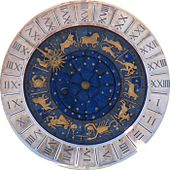 Global Information
Global InformationPlanets in astrology information
| Astrology |
|---|
 |
| Background |
|
| Traditions |
|
| Branches |
|
| Astrological signs |
|
| Symbols |
|
In astrology, planets have a meaning different from the astronomical understanding of what a planet is. Before the age of telescopes, the night sky was thought to consist of two similar components: fixed stars, which remained motionless in relation to each other, and moving objects/"wandering stars" (Ancient Greek: ἀστέρες πλανῆται, romanized: asteres planetai), which moved relative to the fixed stars over the course of the year(s).
To the Ancient Greeks who learned from the Babylonians - the earliest astronomers/astrologers - this group consisted of the five planets visible to the naked eye and excluded Earth, plus the Sun and Moon. Although the Greek term planet applied mostly to the five 'wandering stars', the Ancients included the Sun and Moon as the Sacred 7 Luminaires/7 Heavens (sometimes referred to as "Lights",[1]) making a total of 7 planets. The ancient Babylonians, Greeks, Persians, Romans, Medieval Christians, and others thought of the 7 Classical Planets as gods and named their 7 days of the week after them. Astrologers retain this definition of the 7 Classical Planets today.
To ancient astrologers, the planets represented the will of the deities and their direct influence upon human affairs. To modern astrologers, the planets can represent basic drives or urges in the subconscious,[2] or energy flow regulators representing dimensions of experience.[3] They express themselves with different qualities in the 12 signs of the zodiac and in the 12 houses. The planets are also related to each other in the form of aspects.
Modern astrologers differ on the source of the correlations between planetary positions and configurations, on the one hand, and characteristics and destinies of the natives, on the other. Hone writes that the planets exert it directly through gravitation or another, unknown influence.[4] Others hold that the planets have no direct influence on themselves, but are mirrors of basic organizing principles in the universe. In other words, the basic patterns of the universe repeat themselves everywhere, in a fractal-like fashion, and As above, so below.[5] Therefore, the patterns that the planets make in the sky reflect the ebb and flow of basic human impulses. The planets are also associated, especially in the Chinese tradition, with the basic forces of nature.
Listed below are the specific meanings and domains associated with the astrological planets since ancient times, with the main focus on the Western astrological tradition. The planets in Hindu astrology are known as the Navagraha (literally "nine planets"), with the addition of two shadow bodies Rahu and Ketu. In Chinese astrology, the planets are associated with the life forces of Yin & Yang and the five elements, which play an important role in the Chinese form of geomancy known as Feng Shui. Astrologers differ on the signs associated with each planet's exaltation.
- ^ Hone (1978), p.22
- ^ Hone (1978) p. 19
- ^ Arroyo (1989) pp. 7, 27
- ^ Hone (1978), p.19 8th paragraph
- ^ Copenhaver, Brian P. (1992) Hermetica: The Greek Corpus Hermeticum and the Latin Asclepius in a New English Translation with Notes and Introduction, Cambridge University Press: New York, NY.